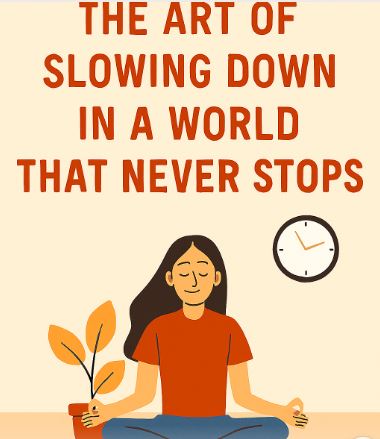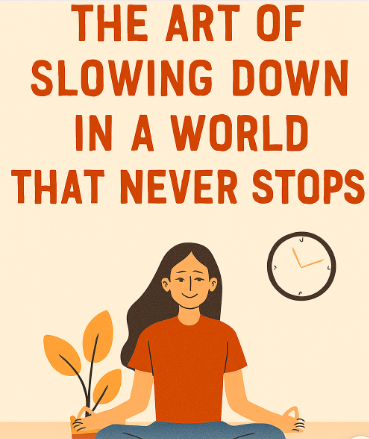The Art of Slowing Down in a World That Never Stops**
If you’ve ever felt like life is moving faster than you can keep up, you’re not alone. The world today runs on speed — fast food, instant messages, same-day delivery, and endless notifications demanding our attention. We chase efficiency like it’s salvation, believing that the faster we go, the more successful we’ll be.
But somewhere along the way, something got lost. Our peace. Our focus. Our ability to simply be.
Slowing down isn’t just about taking a break — it’s a radical choice to live with intention in a culture that confuses busyness with purpose. Let’s explore why slowing down is not weakness, but wisdom.
—
## **The Speed Trap We All Fall Into**
We wake up to alarms, scroll through headlines before our eyes are fully open, rush through breakfast, and then dive into a day that’s packed to the brim. Meetings, deadlines, errands, emails — it feels endless.
At night, we collapse into bed but our minds are still racing. We tell ourselves that once things “settle down,” we’ll relax — but they never do.
This is the modern paradox: we have more tools to save time than ever before, yet we feel like we have *less* time than ever.
Why? Because the faster life gets, the more we fill it with. We don’t slow down when we can — we just speed up what’s next.

When Fast Becomes Frantic
Speed itself isn’t bad. Progress, innovation, and efficiency are wonderful — until they start consuming our attention. When every moment is optimized, there’s no room left for reflection, creativity, or connection.
We begin to live reactively, not intentionally.
We move quickly but think shallowly.
We produce more but experience less.
And that’s when burnout creeps in — not always as exhaustion, but as *emptiness*. That quiet sense that even though you’re doing everything right, something important is missing.
—
## **Slowing Down Is an Act of Presence**
When we slow down, we give ourselves permission to actually *be where we are.*
Have you ever eaten a meal without rushing — really tasting it?
Or walked somewhere without your phone — noticing the air, the sounds, the light?
Or had a conversation where you weren’t just waiting for your turn to speak?
That’s presence. And presence only happens when we’re not sprinting from one moment to the next.
The art of slowing down is not about moving in slow motion; it’s about giving your attention back to the current moment — fully, deliberately, and without distraction.
—
## **The Psychology Behind Slowing Down**
Our brains were never built for constant speed. When we’re overloaded, our nervous system enters a state of perpetual alertness — what psychologists call “chronic low-grade stress.”
Over time, that stress dulls creativity, impairs focus, and even weakens our ability to feel joy.
But when we consciously slow down, the opposite happens:
* Our heart rate stabilizes.
* Our breathing deepens.
* Our brain waves shift from high-frequency beta to more relaxed alpha and theta states — the same ones associated with creativity and flow.
In short: slowing down literally rewires your brain to feel better and think deeper.
—
## **Why Slowing Down Feels So Uncomfortable**
If slowing down feels wrong, that’s because we’ve been conditioned to see stillness as failure.
We fear falling behind.
We fear being judged as lazy.
We fear what might surface if we stop distracting ourselves.
But the truth is, slowing down often brings clarity. It strips away the noise and exposes what really matters.
Maybe you realize that half the things on your to-do list aren’t truly important.
Maybe you rediscover hobbies you abandoned years ago.
Maybe you remember what it feels like to breathe without rushing to the next thing.
The discomfort is just detox — your mind adjusting to a pace that’s actually human.
—
## **Learning from Slow Cultures**
Around the world, there are entire movements dedicated to slowing down.
In Italy, the **Slow Food Movement** began as a protest against fast food culture — a call to reconnect with local ingredients, traditional cooking, and the joy of shared meals.
In Japan, the concept of **“Ma”** celebrates the beauty of empty space — the pause between sounds, the stillness between actions.
And in Denmark, **Hygge** isn’t about speed or efficiency — it’s about comfort, coziness, and being fully present with people you love.
These cultures understand something we’ve forgotten: life isn’t meant to be rushed; it’s meant to be *experienced*.
—
## **Practical Ways to Slow Down Without Falling Behind**
You don’t have to move to the countryside or quit your job to slow down. It’s about small, intentional choices that add up. Here’s where to start:
### **1. Create Morning Space**
Wake up 15 minutes earlier than usual — not to check emails, but to sit quietly, stretch, or enjoy your coffee without distractions. Set the tone for your day with calm, not chaos.
### **2. Practice Single-Tasking**
Do one thing at a time. Eat without scrolling. Write without checking messages. Listen without formulating replies. You’ll not only get more done — you’ll *feel* more grounded doing it.
### **3. Schedule Nothing Time**
Block a few hours each week as unplanned time. No commitments, no productivity guilt. Let the day unfold naturally — it’s surprising how freeing that feels.
### **4. Redefine Productivity**
Productivity isn’t about how much you do — it’s about what truly matters. Focus on high-impact tasks, and give yourself permission to rest without justification.
### **5. Reconnect with Nature**
Go for a slow walk outdoors. Leave your phone behind. Nature has its own rhythm — and spending time in it reminds your body of its natural pace.
The Power of Saying “No”
One of the most powerful ways to slow down is learning to say no.
Every “yes” adds weight to your schedule, even if it’s something small. If it doesn’t align with your values or energy, it’s okay to decline.
Saying no to what drains you is saying yes to what fulfills you.
Remember, you don’t owe everyone your time — but you do owe yourself peace.
Slowing Down Doesn’t Mean Falling Behind
Ironically, slowing down often helps you achieve more. When your mind is clear and focused, you work smarter, not harder. You make better decisions. You produce higher-quality work.
Think of it like driving: when you’re speeding, you might get somewhere faster, but you’re more likely to miss the scenery — or crash. When you drive at a steady pace, you reach your destination safely and enjoy the journey.
That’s what slowing down offers: not less success, but deeper success. The kind that’s measured in meaning, not mileage.
Rediscovering the Rhythm of Life
Life has seasons, just like nature. There’s a time for action, and a time for rest. A time to grow, and a time to simply be.
When we try to stay in constant motion, we break that rhythm — and we burn out. But when we honor the natural ebb and flow of energy, everything feels more balanced.
Slowing down reconnects you with that rhythm. It helps you notice the simple joys — sunlight through a window, laughter over dinner, the quiet satisfaction of doing one thing well.
That’s not wasting time. That’s living it.
Final Thoughts
Slowing down isn’t about rejecting progress — it’s about remembering that life isn’t a race. The world will keep spinning whether you rush or rest.
So breathe. Walk slower. Listen deeper.
You’ll find that the more you slow down, the more life reveals itself — in the spaces between the rush, in the pauses between moments, in the stillness where joy quietly waits to be noticed.
Q: Why is slowing down important in today’s fast-paced world?
Slowing down helps reduce stress, improve focus, and restore mental clarity. It allows your mind and body to reset, making you more creative, productive, and emotionally balanced in the long run.
Q: How can I slow down without falling behind?
You can slow down by prioritizing what truly matters — focus on meaningful tasks, schedule rest, and practice mindfulness. Doing less with intention often leads to better results than constant busyness.
Q: What are simple ways to practice slowing down?
Start with small habits: take screen-free walks, eat meals mindfully, breathe deeply before meetings, and block time for quiet reflection. Even five minutes of stillness can change your entire day.
Q: Does slowing down really improve productivity?
Yes. When you’re calm and present, your brain processes information more efficiently. Slowing down helps you make clearer decisions, avoid burnout, and produce higher-quality work with less effort.
